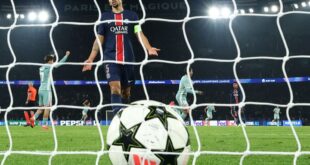PARIS (Reuters) – South Africa have based their domination on a powerful and skilful pack and France expect to face just that when they meet the holders in the World Cup quarter-finals on Sunday.
The Stade de France clash comes 11 months after France earned a 30-26 win in Paris in a brutal affair that saw Pieter Du Toit and Antoine Dupont red carded.
About two thirds of that victorious France team should start on Sunday so they know what to expect.
“We faced them last winter so we have some indications,” France prop Reda Wardi told reporters. “The squad is ready for this kind of game. They (South Africa) are physical and they’re well known for that.
“They try to impress their opponents with their forwards to show their strength.”
The Springboks put seven forwards on the bench in their Pool B clash against top-ranked Ireland and lost 13-8 after missing 11 points from the tee.
Lock Thibaut Flament was replaced early on last November but he had a taste of the South Africa pack. “It was intense, rough, brutal,” he recalled. “We’re expecting just the same.”
France assistant coach Laurent Labit said: “We know what we’re up against and who we’re up against. We have a lot of respect for this team and what they’ve done. They’re an inspiration to us in terms of what they’ve achieved.”
Labit added that France would maybe be more ambitious than they were 11 months ago.
“When we played them last November we decided to close down the game and try to take as few risks as possible,” he explained.
“We had opportunities to play but we were so stuck in the pattern that we lacked ambition. We took that into account. In a World Cup quarter-final will the space be there or not? The priority will be to contain this team and find the space.”
In their only World Cup meeting, in the 1995 semi-finals, France played with ambition against the Springboks but were denied victory after having three tries ruled out.
“We were denied three tries. I don’t see why those tries weren’t valid,” former France winger Emile Ntamack told RMC Sport. “But it was decided otherwise. We still have a bitter taste in our mouths because we feel robbed.”
(Reporting by Julien Pretot; Editing by Ken Ferris)
 BeritaKini.biz Berita Viral Terkini di Malaysia
BeritaKini.biz Berita Viral Terkini di Malaysia





